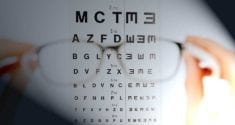Maintaining good eye health is vital to ensuring healthy vision throughout your life. Even so, 3.3 million people in the United States suffer from some type of vision problem; a number that is expected to grow considerably within the next three decades. As you age, your risk for vision problems increases, but following these tips for healthy eyes will help you maintain better vision for longer.
What Eye Health Problems Do You Face as You Age?
 While some people are genetically predisposed to experience eye health issues due to their racial heritage or family health histories, there are other factors that raise the risks of developing vision problems. For instance, people who are obese or who consume high amounts of sugar are more likely to suffer from vision problems.
While some people are genetically predisposed to experience eye health issues due to their racial heritage or family health histories, there are other factors that raise the risks of developing vision problems. For instance, people who are obese or who consume high amounts of sugar are more likely to suffer from vision problems.
Additionally, the risks to eye health increase as people age and reach their senior years. One example is age-related macular degeneration (AMD), which affects the center of the retina. When this condition develops, the individual is no longer able to clearly see fine details. As a result, they experience greater difficulty in driving, reading and performing other tasks that require the ability to focus the eyesight on small objects.
Glaucoma is a condition that can result in vision loss and total blindness if it’s not corrected. One reason that an individual might develop glaucoma is that fluid pressure inside the eye builds up and must be relieved. Recently, it was discovered that the condition can develop even when pressure in the eye is normal.
Other age-related vision problems include:
- Cataracts: With cataracts, a film forms over the lens of the eyes, leading to blindness.
- Diabetic retinopathy (DR): DR involves damage of the blood vessels of the eyes as a result of poor blood sugar regulation.
- Amblyopia: Amblyopia is poor vision in just one eye, which is the result of miscommunication between the brain and the nerve of the eye.
Effective Tips For Healthy Eyes
Taking steps now can help you to maintain healthy eyes into old age. Following are several simple yet effective tips for healthy eyes.
Take a Dietary Supplement
One of the best tips for healthy eyes that you can follow is to take a high-quality dietary supplement that is engineered to protect eye health. A good supplement for maintaining healthy vision will provide several nutrients that will help you maintain healthy eyes and strong vision.
Vitamin E
Free radicals are unstable molecules which travel through your body and attack healthy tissue. Vitamin E protects the cells in the eyes from this type of cellular damage.
Lutein
This compound acts as a powerful antioxidant, benefiting the eyes in multiple ways. In addition to protecting the eye’s cells from the damage that oxidative stress causes, it also helps to reduce inflammation and fight off free radicals.
Zeaxanthin
This is another antioxidant that works together with lutein to help protect against free radicals and oxidative stress.
Lycopene
This antioxidant is beneficial in combating age-related vision problems. Research suggests it’s particularly helpful in reducing the risks for AMD, cataracts and glaucoma. Lycopene may also help lower the risk for the nerve damage caused by diabetic retinopathy.
Bilberry
Some research suggests bilberry can help improve night vision in seniors. Additionally, it may be helpful in improving the vision problems caused by glaucoma. Some subjects exhibited a 30 percent increase in vision after taking a supplement containing bilberry.
Omega-3 Fatty Acids
While omega-3 fatty acids have been shown to benefit physical health in many ways, recent research has found that the compound also helps support eye health. It may protect against age-related macular degeneration in seniors. Additionally, it helps regulate fluid in the eyes, which helps lower the risk of developing glaucoma.
Choose Low-Glycemic Index Standards
You can also reduce the risk of developing vision problems by changing your diet. In particular, opt for foods that rate lower on the glycemic index chart. This involves eating brown rice instead of white rice and choosing whole grain bread instead of white bread. You should also replace white and yellow potatoes with yams. Instead of eating potato chips, buy nuts and seeds.
Get More Exercise
You should be getting a minimum of 30 minutes of moderate to high intensity exercise each day, but getting more will help you keep your eyesight healthy. Physical activity helps burn more energy, which means more sugar will be pushed to your cells and your blood glucose levels will be lower. As a result, your risk for age-related macular degeneration and diabetic retinopathy will be reduced. Lower blood sugar levels will also help protect the blood vessels in your eyes from damage.
Get Treatment For Chronic Conditions
 Certain conditions, including hypertension and multiple sclerosis, can pose a danger to your vision if you don’t take steps to control them. This is because these types of medical conditions lead to chronic inflammation throughout the body. Once inflammation develops in or around the eyes, your vision will be affected. In taking steps to reduce inflammation and control the other symptoms of degenerative diseases, you’ll better protect your eye health.
Certain conditions, including hypertension and multiple sclerosis, can pose a danger to your vision if you don’t take steps to control them. This is because these types of medical conditions lead to chronic inflammation throughout the body. Once inflammation develops in or around the eyes, your vision will be affected. In taking steps to reduce inflammation and control the other symptoms of degenerative diseases, you’ll better protect your eye health.
Wear Your Sunglasses and Add a Hat
The sun is just as harmful to your eyes as it is to your skin, so it’s important to wear eye protection whenever you go outdoors. This includes wearing sunglasses that are designed to filter out UVA and UVB rays. Additionally, you should wear a wide-brimmed hat if you’ll be outside for an extended period of time.


